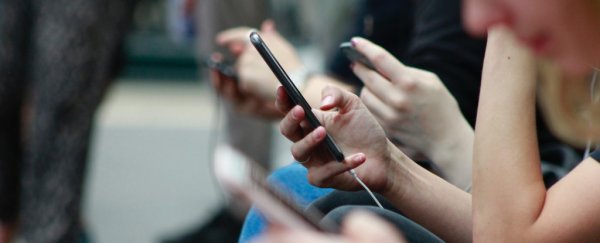It may sound strange at first, but a team of researchers in Australia has come up with a method to predict your personality traits using just the accelerometer in your phone.
Well, that and your call and messaging activity logs. Also, the system works for some traits better than others. But it's an interesting take on how we may find connections through such seemingly unrelated things.
There's a wealth of previous research investigating how different aspects of your smartphone and social media use - such as your language in messages, how you style your Facebook profile, or how much physical activity you do - can be used to predict your personality traits.
"Activity like how quickly or how far we walk, or when we pick up our phones up during the night, often follows patterns and these patterns say a lot about our personality type," said one of the team, computer scientist Flora Salim from RMIT University in Australia.
In this case, we start at the Big Five personality traits. These have been used in psychology since the 1980's to help classify five dominant parts of our personalities.
These five traits are extraversion (outgoing vs reserved), openness (curious vs cautious), neuroticism (confidence vs nervous), agreeableness (compassionate vs detached) and conscientiousness (organised vs easy-going).
"Big Five is the most prevalent way to determine personality," marketing psychologist Billy Sung from Curtin University, who was not involved in the research, told ScienceAlert.
"Of course, like any other scales or measurement, it has its critics. For instance, many researchers are skeptical whether five higher-order personality traits can account for the variance of personality in general."
Although it's not perfect, it's one of the best systems we have to scientifically measure personality.
The researchers analysed 52 people's phone habits between March 2010 and July 2011. Each participant was given a phone with sensing and collection software on it, which gave the researchers information on when and how much the phone was moving (accelerometer data), as well as the number and time of day of all calls and messages.
The participants were also asked to complete a Big Five survey to score their personalities on the five traits.
Then, the team also created a list of features related to the aspects of phone use they measured, that might potentially determine personality traits; for example, physical activity on weekend nights might predict extraversion, or the number of calls one makes might predict agreeableness.
After crunching the numbers, the researchers found that some of the phone features really did predict some of the personality traits for the 52 participants. While they worked with a small sample size, it's interesting to see that phone data best predicted neuroticism, conscientiousness, and extraversion.
The logs weren't as useful at predicting the other two traits, especially openness. And this makes sense, since some personality traits are linked to activity, and some are more internal.
"In daily life, it is also hard to tell if someone is inventive or curious by his/her activity intensity pattern," the team writes in their paper.
There's also the issue of whether the team were actually looking at personality traits, or if the personality traits could be masked by other factors.
"There are many extraneous variables here," Sung told ScienceAlert.
"For instance, neuroticism may be associated with different regularity of activity intensity in the night, however we cannot rule out many other possible explanations (e.g. neurotic people are more prone to stress and therefore - if this is the case, anyone with different personality traits that are stressed will still exhibit the same results)."
This is the first time researchers have combined this accelerometer data with traditional phone activity; to validate such research, we'll need to see more studies done in a similar manner, hopefully with larger sample sizes.
It can also be viewed as a 'pilot' study to see what's possible with mobile data, rather than something that is going to be directly important in our lives in the near future. Scientists have already done studies on things like our browser history, and can find out much more information about our personalities that way.
In fact, that's exactly what happens every time you open Facebook or Google.
But even with all these caveats, the study itself is still fascinating. It's a great reminder that we don't even need to be online to give away more information than we'd probably like.
The study has been published in Computer.
